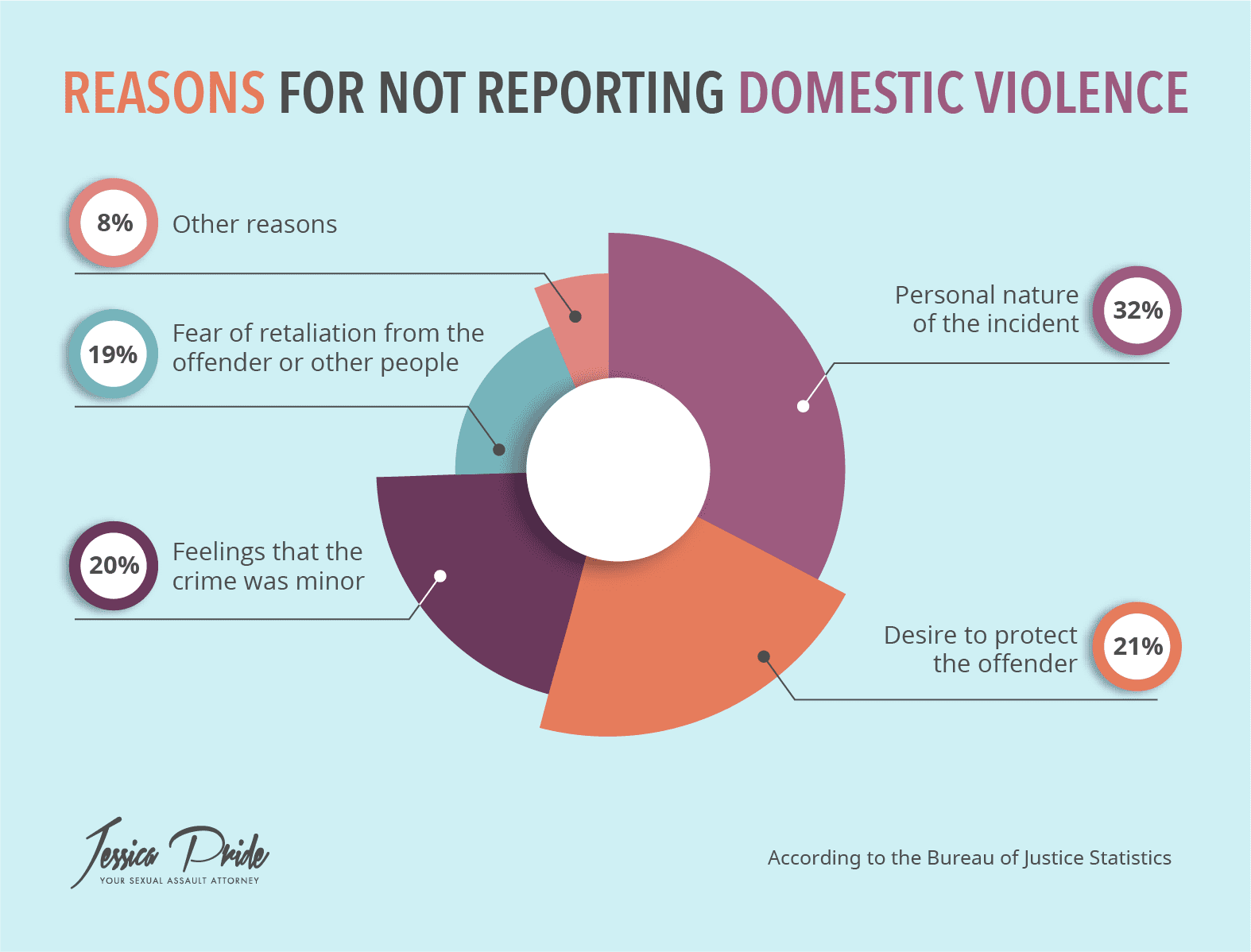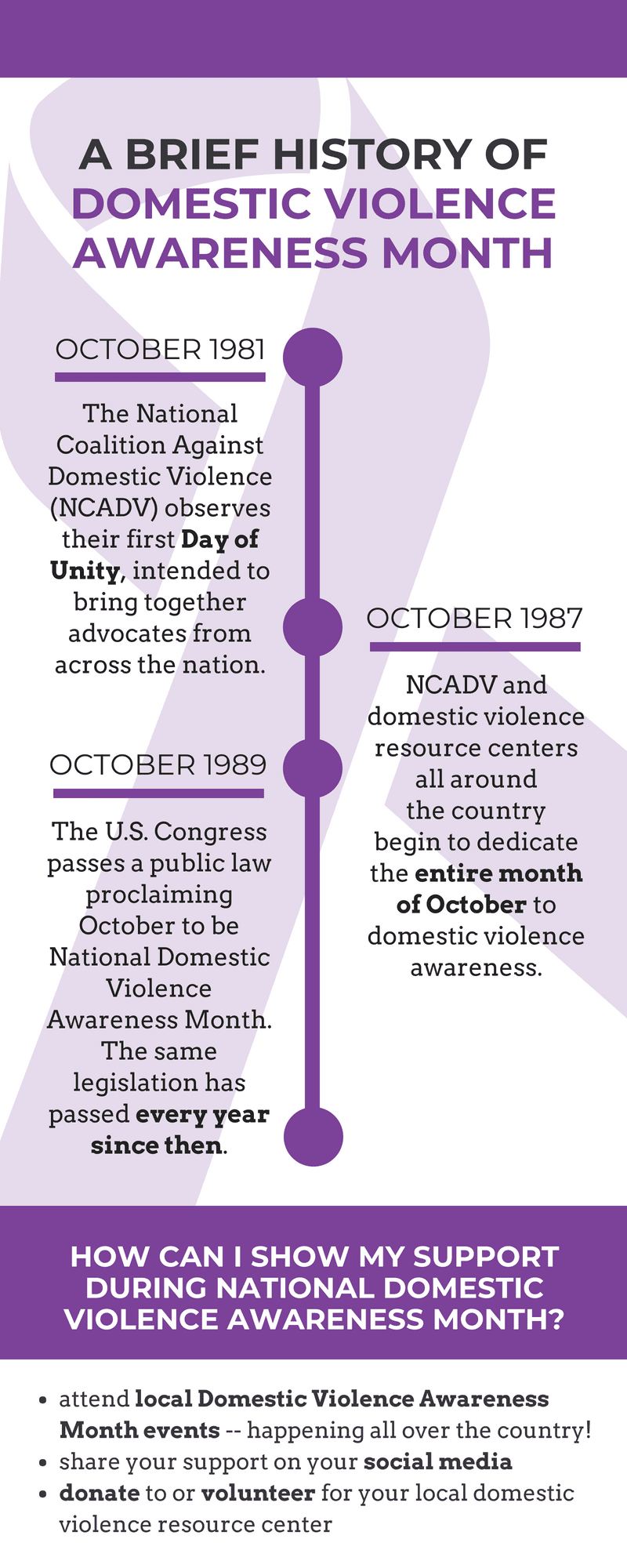
October is Domestic Violence Awareness Month (DVAM). This month is devoted to putting an end to this serious issue that impacts our families and communities. Most people know at least one person who has lived through domestic violence. DVAM gives us the space to raise awareness, educate ourselves, and support friends or family who are survivors of abuse. Domestic violence affects millions of people each year. It is prevalent in every community, and does not discriminate with regard to sex, gender identity, age, nationality, religion, or socio-economic status. It doesn’t just include physical violence — it also entails emotional abuse, controlling behavior, manipulation, and many other types of conduct. Domestic violence creates damaging consequences and must be stopped. We need your participation to uplift our communities and prevent these crimes from happening again.
Why Domestic Violence Awareness Month Matters
Domestic violence often goes unreported. Many people simply don’t know how common the issue is. A person very close to you could be a survivor without you knowing it. In fact, you yourself might even be involved in ways you don’t realize, since domestic violence includes many forms of non-physical abuse. Consider the following: In a 10-year period (2005 to 2016), an average of 582,000 non-fatal domestic violence incidents went unreported to the police each year. In 32 percent of these cases, the survivors cited the personal nature of the event as a reason for not reporting it. Other reasons for not reporting included: a desire to protect the offender (21 percent), feelings that the crime was minor or unimportant (20 percent), or a fear of retaliation from the offender or other people (19 percent).

These additional domestic violence statistics paint a picture of just how widespread this problem is:
- 1 in 4 women and 1 in 9 men experience severe physical violence, sexual violence, and/or stalking from their intimate partner
- On a typical day, more than 20,000 phone calls are made to domestic violence hotlines in the U.S.
- In the U.S., an average of 20 people experience some form of intimate partner physical violence per minute
Survivors can often feel reluctant to share their stories or speak about a tragedy they have witnessed for a whole host of reasons. Domestic Violence Awareness Month was created to help survivors understand they are not alone, and can voice their experiences with others who have faced similar trials.
How DVAM Began
DVAM was conceived by the National Coalition Against Domestic Violence (NCADV). The Month evolved from what was originally called the “Day of Unity”, held in October 1981. The Day of Unity soon stretched into a week devoted to various activities held at the local, state, and national levels. Themes included:
- Celebrating survivors of domestic violence
- Remembering those who have lost their lives due to violence
- Connecting those whose aim is to end domestic violence
These themes are still a central focus of DVAM events. Domestic Violence Awareness Month was first officially observed in October of 1987. 32 year years later, the movement is still going strong and continues to grow and expand each year.

Get Involved in the Movement
It is truly inspiring and encouraging to see how a relatively small idea has grown into a nationwide, month-long event. Each person’s contribution and participation actually matters, because they often contain the seeds for real transformation. Here are steps you can take to get involved in furthering the cause:
- Attend a DVAM Event: The National Resource Center on Domestic Violence maintains a list of DVAM events held throughout the country. Community events are a powerful way to show support and spread awareness because they bring the issue out into the public eye.
- Explore domestic violence resources: Here’s a list of several domestic violence resources, organizations and institutions, many of them located in the San Diego area. These provide education, support, and guidance on domestic violence issues.
- Join or support an organization: Domestic violence organizations can connect you with a network and a community of support for survivors and advocates. Most of them also accept financial donations if you’d like to show support in that way.
- Share your knowledge and experiences: Your own personal story can do much to spread awareness of domestic violence and its surrounding issues. Whether it’s talking to a friend or writing a blog post, more communication puts the spotlight on this subject that’s often kept in the dark. Even the smallest ripples can gain momentum to become full-fledged waves of change.
Get Support and Assistance
If you are facing challenges caused by domestic violence and need help, don’t hesitate to reach out for support, advice, and encouragement. A 24-hour support hotline is available for those who need to speak with a professional who is trained in guiding domestic violence survivors through their circumstances.
If you have experienced domestic violence, Jessica Pride wants to help you once again take a stand for your safety and rights. No man or woman deserves to be treated in such a way.If you have been assaulted or know someone who has, and would like to learn what you can do to gain legal recourse, please contact us at 619-516-8166.
All information is kept confidential, and your phone call is free and without obligation. Speaking out is your first step to getting justice. The Pride Law Firm can provide empowerment and help you heal.
Related Posts
Sexual assault is a difficult topic to discuss, but one that affects too many lives to go ignored. Most sexual assault perpetrators are known to the victim.
Grasping the specific laws around sexual assault is a crucial step towards reclaiming your power and pursuing healing. Learn more about sexual assault under California law so you can better understand your rights as a survivor.
It’s crucial for people to know the difference between molestation and sexual assault in order to find the right help and legal support.
Spiked drinks heighten the risk of sexual assault or other violent crimes. A new law requires certain establishments that serve alcohol to offer alcohol testing kits.





